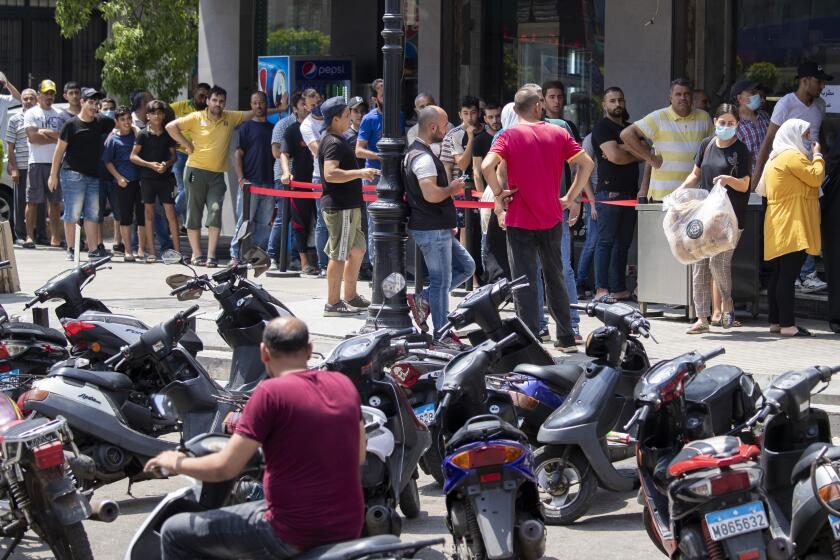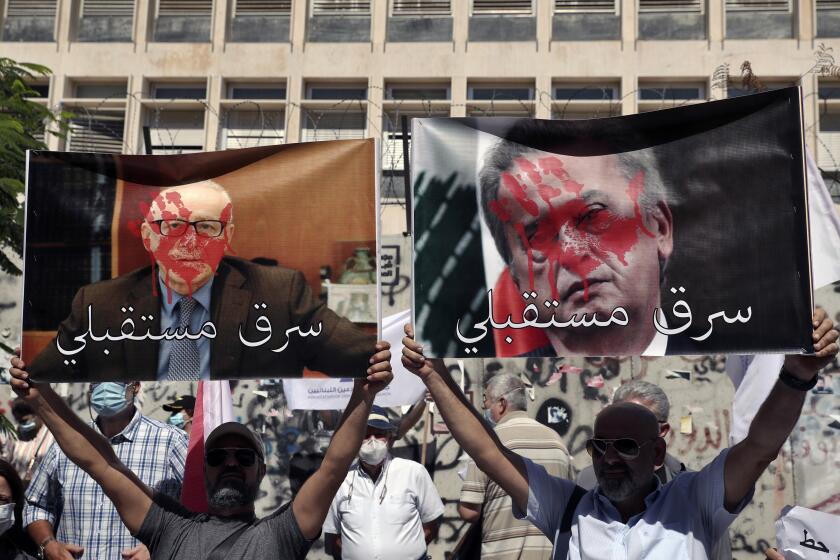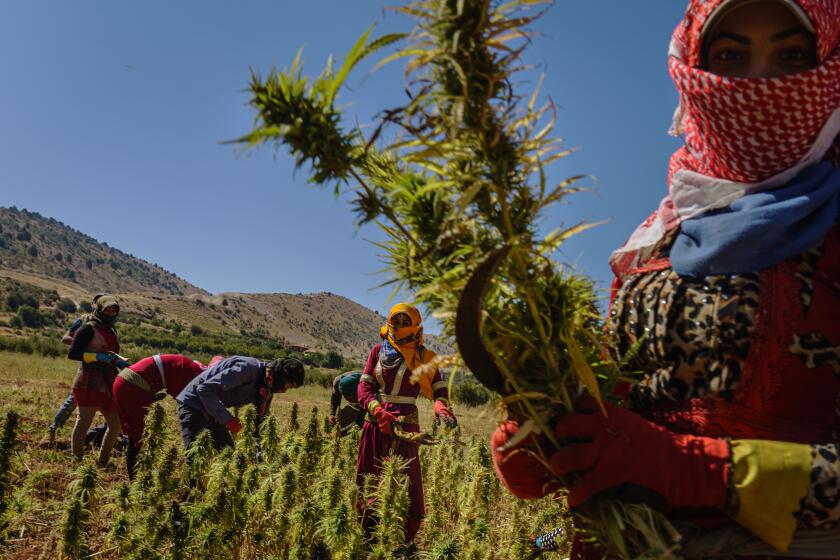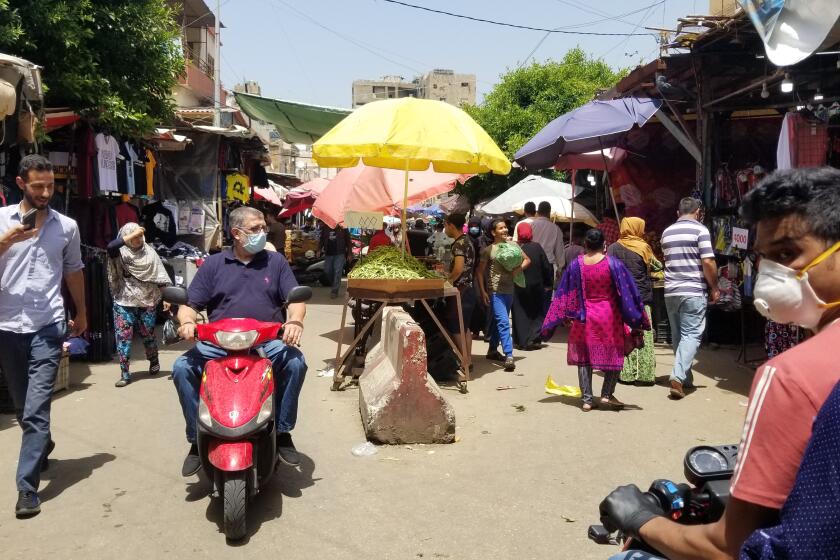Record inflation has hit even Lebanon’s garbage. ‘Trash just isn’t like it used to be’
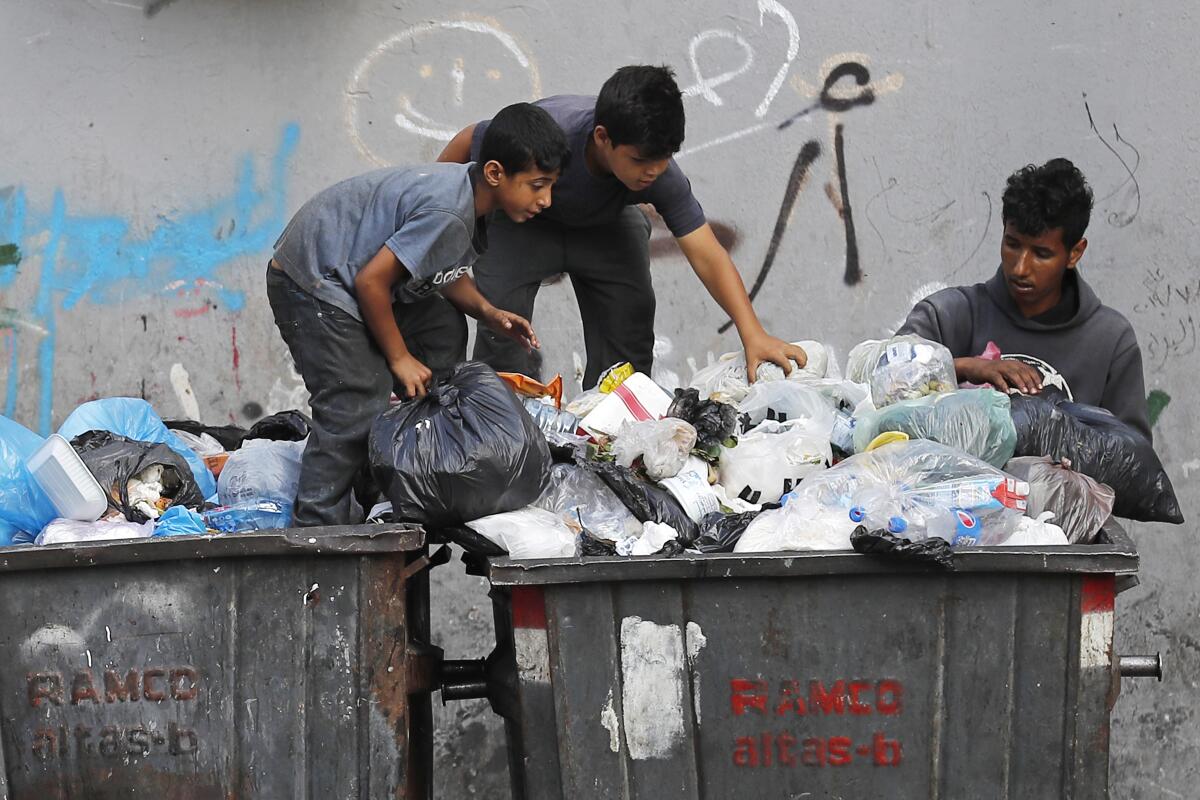
BEIRUT — Rolling to a stop on his overladen scooter, Shaher Hassan awkwardly balanced five bags and a carton full of cans, plastic bottles and other recyclables mined from the trash that day. In an unpaved alleyway in Lebanon’s capital, he handed the load off to another young man, who took it inside the cramped apartment the two of them shared with five other people — one room for sleeping, the other for mounds of reclaimed refuse.
Hassan squatted and lit a cigarette, his eyes a bit red from a 6:30 a.m. wake-up. After eight hours of dumpster diving, his haul — which he would later take to collectors to export to Turkey or Egypt for processing — would make $10, maybe $15 if he was lucky.
It hadn’t always been this hard. Hassan, 33, has been scavenging through trash since 2005, having come to Beirut as a teenager with his family from eastern Syria to work as a nakaash — in Arabic, literally “one who pokes,” but in this context, a recyclable refuse collector.
But the Beirut he roams each day on his scooter has been transformed by a financial implosion so calamitous — experts put it among the world’s worst since the 19th century — that even the nature and value of garbage have changed.
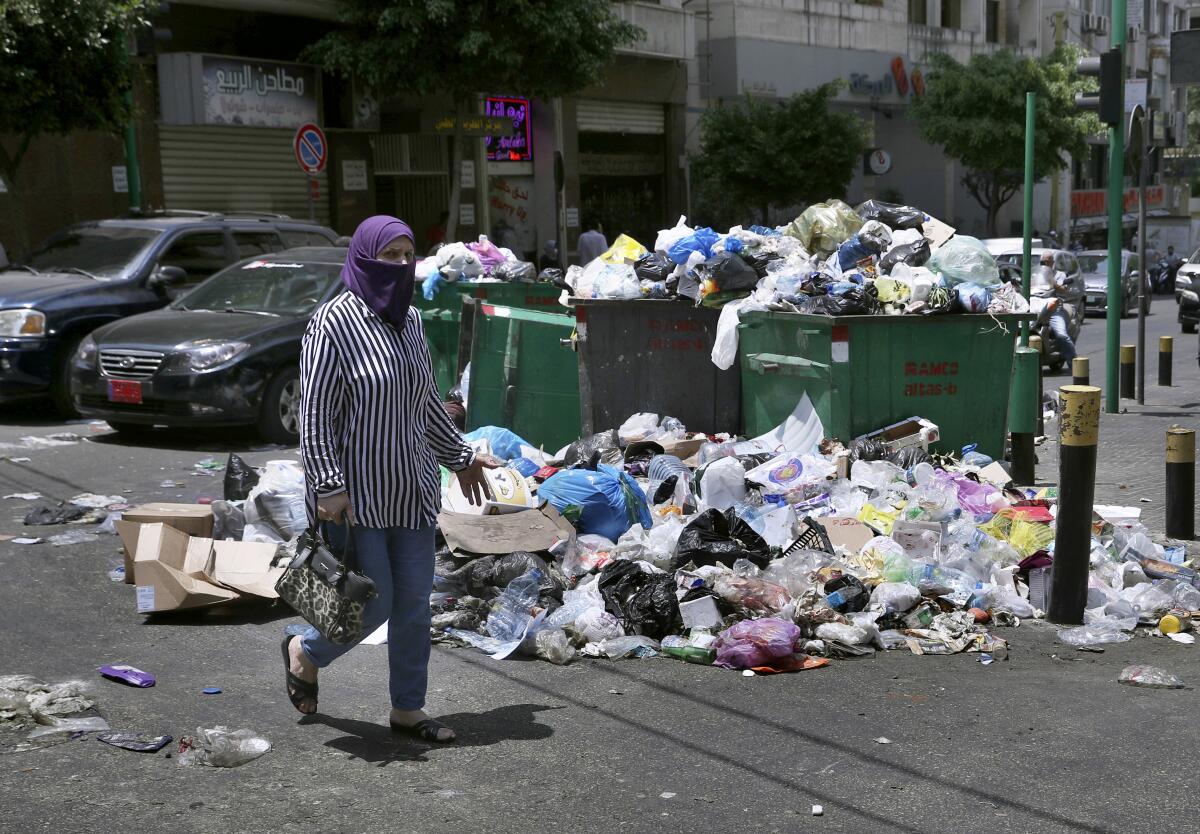
“Before, you’d find clothes, appliances, things people threw out you could sell for real money. That’s all gone. If someone has a problem with an appliance, they repair it. No one leaves that kind of stuff out anymore,” he said.
“Trash just isn’t like it used to be.”
Little is these days in Lebanon. In the last three years, the economy has shrunk to less than half its size, dragging fully three-quarters of the country’s 5.5 million people down into poverty with it. So battered is the local currency that its largest denomination, the 100,000-lira bill, is equal to little more than a dollar in stores, gas stations and most offices.
Official figures put the annual inflation rate for food and nonalcoholic beverages at 350%. In April, overall inflation hit an annual rate of 269%, despite the government downgrading the lira’s exchange rate to one-tenth of its value weeks before.
Shortages of basic goods have hit Lebanon as its leaders do little to resolve a long-running currency crisis that has sparked despair and desperation.
Hassan and his friend, 42-year-old Mulhaq Hmood, another nakaash, who works a coastal neighborhood just north of Beirut, see the effect of that economic devastation everywhere.
“We used to not bother picking up plastic bottles and things like that. Now we have to,” Hmood said.
But even such low-value items, he added, are in shorter supply. A can of Coke used to cost 750 lira, or half a dollar, which nearly everyone could afford. Now it costs 9,000 lira according to the recently modified official exchange rate, or about 60 cents.
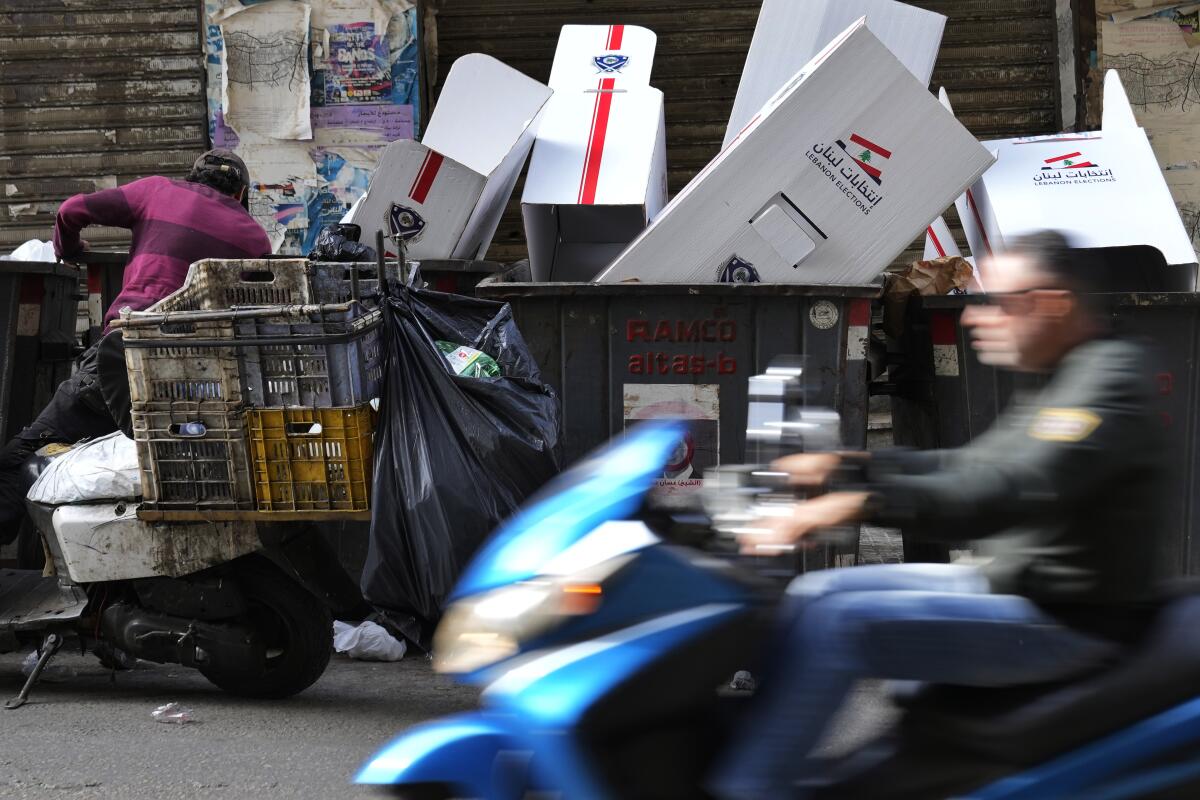
Even more dire, shops and traders use an unofficial, street exchange rate that puts a can of Coke at the astronomical price of 55,000 lira. At those heights, people just don’t consume as much.
As trash pickings become so much slimmer, competition for them has grown fiercer. Some neighborhood dumpsters are now subject to low-level turf wars between different groups of sorters. The profile of those who comb through garbage has changed as well.
“The work is hard, so normally only young men were doing it. But since the crisis began, we’re getting women — young and old — coming in every day,” said Evita AlSet, 24, who works with her father at a metal collection company in Beirut’s industrial district.
The so-called Pandora Papers show how Lebanon’s politicians and bankers stowed wealth in offshore tax havens and used it to buy expensive properties.
An entire ecosystem has sprung up in support of the maxim that one person’s trash is another person’s treasure.
Sorters like Shaher and Mulhaq are, almost literally and metaphorically, at the bottom of the heap, where eking out even a threadbare living requires constant vigilance. Wake up late in the morning and you’ll have to content yourself with scraps left by rivals rifling through rubbish spread out on the side of the road. Come back from a bar crawl in Beirut’s party strip and you’ll catch children peering over the lip of a garbage bin, eyeing empty beer bottles and once-scorned cans just as the night’s revelries come to a close.
“A person selling aluminum cans made 20 cents a kilo. That was 300 lira, so no one cared,” AlSet said. “Now? That’s 20,000 [lira]. Ten dollars is almost a million. It feels like actual money.”
Salaries haven’t kept up with the lira’s ever-dwindling value. The national minimum wage for private employees is now 9 million lira per month — equivalent to approximately $93 on the street. And bank closures, not to mention limits on withdrawals, mean people need the cash that unregulated work like gleaning from garbage can provide.
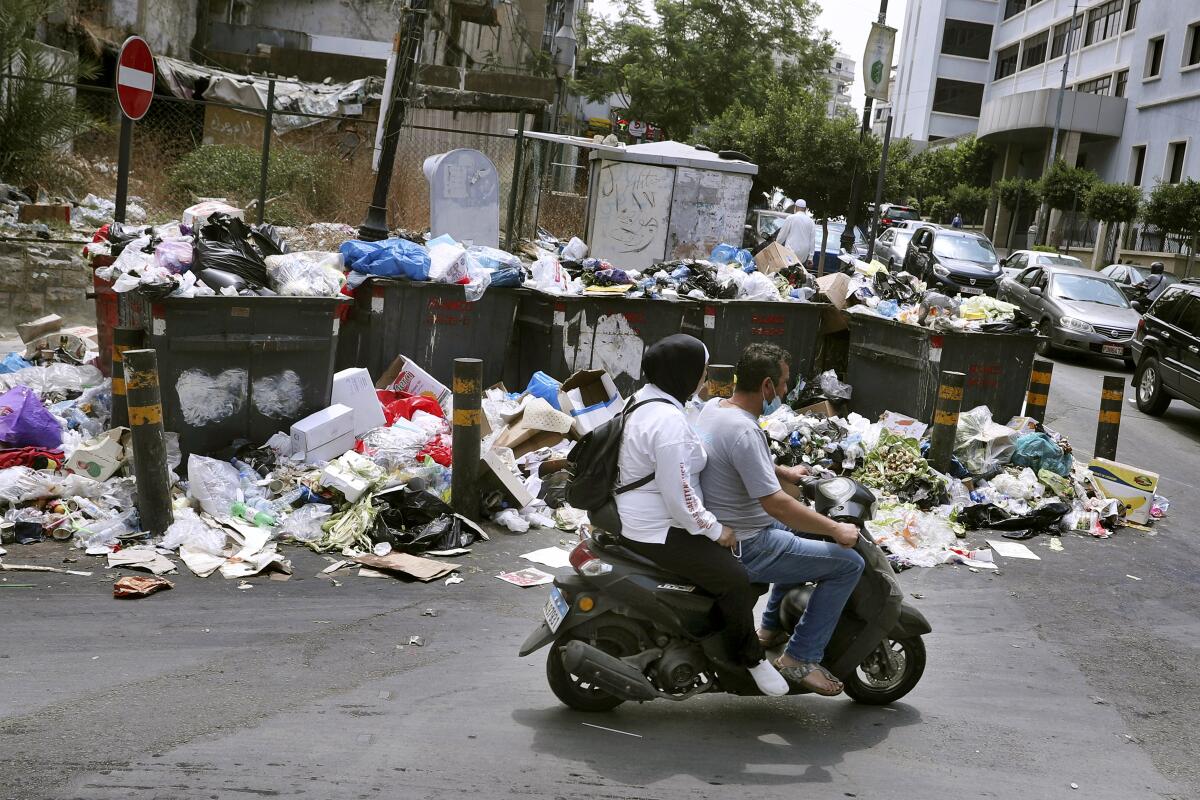
But a lot of recyclable items aren’t getting thrown out anymore, AlSet said, because their owners are feeling financially pinched themselves. In 2015, when the main company in charge of Beirut’s waste management shut down, garbage piled up in ever-expanding mounds on side streets, spurring exhortations to residents from environmental activists and nongovernmental organizations to sort and reduce waste.
Few people were listening then. They are now.
“You have people who are quite well off, [with] fancy Mercedes or a BMW, tinted windows — they don’t even leave the car — coming to us, selling appliances and car batteries, all the things they wouldn’t even worry about throwing out before,” AlSet said.
Lebanon has legalized marijuana farming — already a thriving illicit industry — in hopes of giving a boost to its foundering economy.
The economics have changed for Hassan too. As a teenager, he could leave his village in eastern Syria, stay a month and a half in Lebanon, and then go home again with $500 — enough to last six months, better than a construction worker’s take. But successive crises in Lebanon and Syria’s intractable civil war mean he can now barely cobble together enough to return to Syria every 18 months.
Hmood, his 13-year-old son — who has never been to school — and his brother send a portion of their earnings in Lebanon to 25 family members back in Syria.
On a good day, they each scavenge about 33 pounds of tin and 44 pounds of plastic. Against that are their expenses: The apartment they share with four other people costs $175 a month; the two scooters they use require about $9 a day in gas; there’s food and sundry. They still manage to send some money to their relatives.
Most others can’t, including Hmood’s nephew, Mohammad, a wiry 20-year-old in a Guns N’ Roses T-shirt.
News Alerts
Get breaking news, investigations, analysis and more signature journalism from the Los Angeles Times in your inbox.
You may occasionally receive promotional content from the Los Angeles Times.
“He’s been here two years. He hasn’t sent a single cent back home,” Hmood said. Mohammad gave a sheepish smile.
In desperation, many sorters turn to landfills like one on the coast a few miles away, north of Beirut’s premium waterfront neighborhood.
One recent morning, garbage trucks roared up the hill to a plateau made of tons of trash and dirt piled dozens of feet high. One of the trucks navigated a path between piles and released its load as a handful of sorters leaned dangerously close to the cascade of falling rubbish, angling for a first look at the spoils. A light sea wind seemed too meek to dislodge the miasma of rotting, sun-baked refuse.
“Honestly, I don’t even smell it any more,” said Mahmoud, a sinewy 22-year-old in a black Salomon jacket, track suit and sandals. Taking a pause from poking a waist-high garbage mound, he gestured toward a small clearing to the side.
The Lebanese government’s last-minute decision to postpone the start of daylight saving time until the end of Ramadan results in mass confusion.
“We sleep there no problem,” said Mahmoud, who gave only his first name to avoid harassment. “I know people who stay here for three days straight.”
From a nakaash’s point of view, the landfill was a treasure trove. You could double the haul you normally got on the streets, even in leaner moments like this. But it was a dismal, toxic task to go through the concentrated trash of a city, a task Hassan deemed too risky: Those who worked there routinely developed scabs, and all that contamination in the air seemed to have an effect, he said.
“The people coming out of the landfill, you can smell them. When they talk to you, they sound like they’re high,” he said.
Finishing his cigarette in the alleyway outside his apartment building, he stood up and got back on his scooter. It was time for another run.
“What else am I going to do? We have to continue like this,” he said. “I don’t know how to do anything else anyway.”
He switched on the scooter, its engine whining as he raced away.
More to Read
Sign up for Essential California
The most important California stories and recommendations in your inbox every morning.
You may occasionally receive promotional content from the Los Angeles Times.
